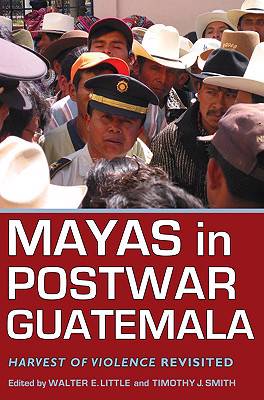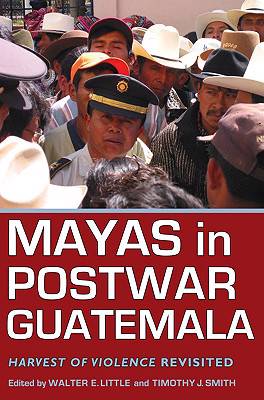
- Afhalen na 1 uur in een winkel met voorraad
- Gratis thuislevering in België vanaf € 30
- Ruim aanbod met 7 miljoen producten
- Afhalen na 1 uur in een winkel met voorraad
- Gratis thuislevering in België vanaf € 30
- Ruim aanbod met 7 miljoen producten
Zoeken
Mayas in Postwar Guatemala
Harvest of Violence Revisited
€ 38,45
+ 76 punten
Omschrijving
Like the original Harvest of Violence, published in 1988, this volume reveals how the contemporary Mayas contend with crime, political violence, internal community power struggles, and the broader impact of transnational economic and political policies in Guatemala. However, this work, informed by long-term ethnographic fieldwork in Mayan communities and commitment to conducting research in Mayan languages, places current anthropological analyses in relation to Mayan political activism and key Mayan intellectuals' research and criticism. Illustrating specifically how Mayas in this post-war period conceive of their social and political place in Guatemala, Mayas working in factories, fields, and markets, and participating in local, community-level politics provide critiques of the government, the Maya movement, and the general state of insecurity and social and political violence that they continue to face on a daily basis. Their critical assessments and efforts to improve political, social, and economic conditions illustrate their resiliency and positive, nonviolent solutions to Guatemala's ongoing problems that deserve serious consideration by Guatemalan and US policy makers, international non-government organizations, peace activists, and even academics studying politics, social agency, and the survival of indigenous people.CONTRIBUTORSAbigail E. Adams / José Oscar Barrera Nuñez / Peter Benson / Barbara Bocek / Jennifer L. Burrell / Robert M. Carmack / Monica DeHart / Edward F. Fischer / Liliana Goldín / Walter E. Little / Judith M. Maxwell / J. Jailey Philpot-Munson / Brenda Rosenbaum / Timothy J. Smith / David Stoll
Specificaties
Betrokkenen
- Uitgeverij:
Inhoud
- Aantal bladzijden:
- 264
- Taal:
- Engels
- Reeks:
Eigenschappen
- Productcode (EAN):
- 9780817355364
- Verschijningsdatum:
- 17/05/2009
- Uitvoering:
- Paperback
- Formaat:
- Trade paperback (VS)
- Afmetingen:
- 155 mm x 231 mm
- Gewicht:
- 408 g

Alleen bij Standaard Boekhandel
+ 76 punten op je klantenkaart van Standaard Boekhandel
Beoordelingen
We publiceren alleen reviews die voldoen aan de voorwaarden voor reviews. Bekijk onze voorwaarden voor reviews.










